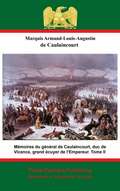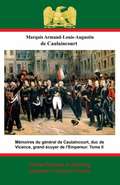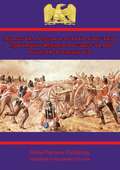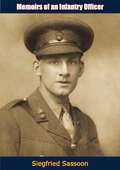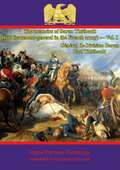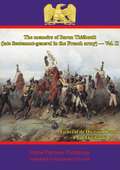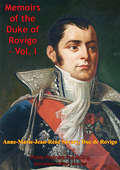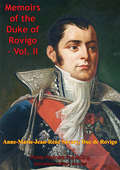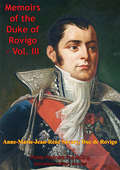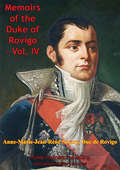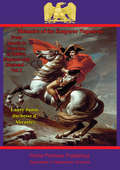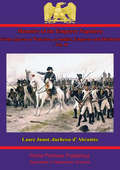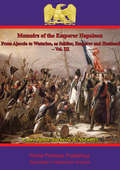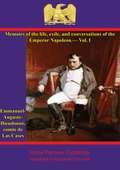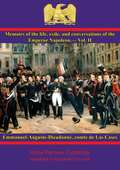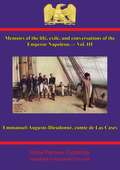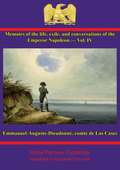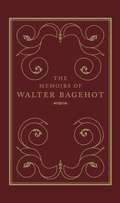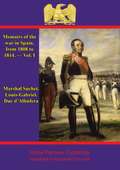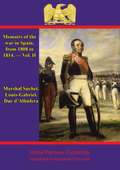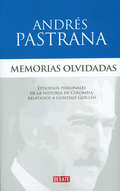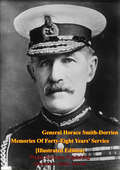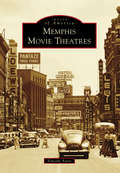- Table View
- List View
Mémoires du général de Caulaincourt, duc de Vicence, grand écuyer de l’Empereur. Tome II (Mémoires du général de Caulaincourt, duc de Vicence, grand écuyer de l’Empereur. #2)
by Général de Division Armand Augustin Louis de Caulaincourt, Duc de Vincence« Caulaincourt n'avait cessé sous l'Empire de prendre des notes chaque jour au bivouac ou dans le cabinet de Tuileries. Il se serait décidé à les mettre en forme entre 1822 et 1825. L'énorme documentation réunie quotiennement explique la valeur du témoignage du duc de Vicence... le récit ne commence qu'à l'entrevue d'Erfurt. Il se poursuit avec la campagne de Russie et la retraite. C'est dans les chapitres VII-VIII et XI [ « En traîneau avec l'Empereur » ] souvent réédites que l'on dispose d'un document de premier ordre sur l'état d'esprit de Napoléon après le désastre de 1812. Quittant la Grande Armée, l'Empereur voyage en la seule compagnie de Caulaincourt de Smorgoni à Paris. Pendant ce long voyage, Napoléon se confie au Grand Ecuyer avec d'autant plus de franchise qu'il ignore que Caulaincourt prend des notes.« Puis Caulaincourt narre les péripéties de Congrès de Châtillon et y justifie son attitude. On notera d'importants développements sur l'entrée des Alliés à Paris, l'attitude de Napoléon, la défection de Marmont, l'abdication et la tentative de suicide de l'Empereur. Les mémoires s'arrêtent aux « Adieux de Fontainebleau » p 33 - Professeur Jean Tulard, Bibliographie Critique Des Mémoires Sur Le Consulat Et L'Empire, Droz, Genève, 1971Tome II - Moscou, La Retraite, En Traîneau Avec l'Empereur, L'Arrivée à Paris
Mémoires du général de Caulaincourt, duc de Vicence, grand écuyer de l’Empereur. Tome III (Mémoires du général de Caulaincourt, duc de Vicence, grand écuyer de l’Empereur. #3)
by Général de Division Armand Augustin Louis de Caulaincourt, Duc de Vincence« Caulaincourt n'avait cessé sous l'Empire de prendre des notes chaque jour au bivouac ou dans le cabinet de Tuileries. Il se serait décidé à les mettre en forme entre 1822 et 1825. L'énorme documentation réunie quotiennement explique la valeur du témoignage du duc de Vicence... le récit ne commence qu'à l'entrevue d'Erfurt. Il se poursuit avec la campagne de Russie et la retraite. C'est dans les chapitres VII-VIII et XI [ « En traîneau avec l'Empereur » ] souvent réédites que l'on dispose d'un document de premier ordre sur l'état d'esprit de Napoléon après le désastre de 1812. Quittant la Grande Armée, l'Empereur voyage en la seule compagnie de Caulaincourt de Smorgoni à Paris. Pendant ce long voyage, Napoléon se confie au Grand Ecuyer avec d'autant plus de franchise qu'il ignore que Caulaincourt prend des notes.« Puis Caulaincourt narre les péripéties de Congrès de Châtillon et y justifie son attitude. On notera d'importants développements sur l'entrée des Alliés à Paris, l'attitude de Napoléon, la défection de Marmont, l'abdication et la tentative de suicide de l'Empereur. Les mémoires s'arrêtent aux « Adieux de Fontainebleau » p 33 - Professeur Jean Tulard, Bibliographie Critique Des Mémoires Sur Le Consulat Et L'Empire, Droz, Genève, 1971Tome III - Le Congres de Châtillon, et L'Agonie de Fontainebleu.
Memoirs of a Sergeant in the 43rd Light Infantry in the Peninsular War
by AnonIn this anonymously published memoir, the experiences of a "light-bob", or light infantryman, are recounted in a readable and exciting account. The Author reveals himself to be a proud Irishman who joined the 43rd in time to join the expedition to Denmark, before embarking on more serious skirmishing and heavy fighting in the Peninsular. First during Sir John Moore's retreat to Coruña and then as part of the famed Light Division under General Craufurd. His view of the actions on the Coa, Masséna's invasion of Portugal, the battle of Fuentes d'Oñoro, the siege of Ciudad Rodrigo follow before his wounds at the storming of Badajoz force his retirement.The author gives an excellent account of the day-to-day life as an N.C.O. in the light infantry, tactics and experience recounted in detail, along with the impact on the Portuguese and Spanish civilians that he encounters.An enjoyable Peninsular read.Author -- AnonText taken, whole and complete, from the edition published in 1835, London, by John Mason.Original Page Count - 278 pages.
Memoirs of a Stuka Pilot
by Helmut Mahlke&“Well-written and holds the reader&’s attention . . . an engaging book and a rare personal view of flying one of the most iconic aircraft of WWII.&” —Firetrench After recounting his early days as a naval cadet, including a voyage to the Far East aboard the cruiser Köln and as the navigator/observer of the floatplane carried by the pocket battleship Admiral Scheer during the Spanish Civil War, Helmut Mahlke describes his flying training as a Stuka pilot. The author&’s naval dive-bomber Gruppe was incorporated into the Luftwaffe upon the outbreak of war. What follows is a fascinating Stuka pilot&’s-eye view of some of the most famous and historic battles and campaigns of the early war years: the Blitzkrieg in France, Dunkirk, the Battle of Britain, the bombing of Malta, North Africa, Tobruk, and Crete, and, finally, the invasion of the Soviet Union. Mahlke also takes the reader behind the scenes into the day-to-day life of his unit and brings the members of his Gruppe to vivid life, describing their off-duty antics and mourning their losses in action. The story ends when he himself is shot down in flames by a Soviet fighter and is severely burned. He was to spend the remainder of the war in various staff appointments. &“An engaging, engrossing and exceptionally informative book. A worthy addition to any military enthusiast&’s library and is unhesitatingly and heartily recommended.&” —Aviation History
Memoirs of an Infantry Officer (Memoirs of George Sherston #2)
by Siegfried SassoonThis autobiographical novel of the eminent English poet, Siegfried Sassoon was first published in 1930. The Memoirs of an Infantry Office, widely considered a classic among war books, tells of the author’s steady disillusionment with the Army—and of his ultimate rebellion against the cruel realities of war.Sassoon’s fluid, sensitive prose, the fine perceptions of the poet is spoken here in the voice of the average man. With charm and humor and quiet understatement, he has managed to articulate the hidden feelings of any sensitive man who in the normal course of his life is suddenly exposed to the nightmare of war.An unforgettable read.
The memoirs of Baron Thiébault (The memoirs of Baron Thiébault (late lieutenant-general in the French army) #1)
by Arthur John Butler Général de Division Baron Paul-Charles-François-Adrien-Henri Dieudonné ThiébaultGeneral Thiébault was always destined for a career in the military: his father was a professor in the military school in Berlin and a friend of Frederick the Great. Having started as a volunteer in the Revolutionary army, he started to acquire a reputation for his knowledge of military matters and staff work. He was then attached to Army of Italy in 1797, being distinguished for his personal bravery and keen wit, afterward serving under Masséna during the siege of Genoa (1800). His brigade played a pivotal role during the battle of Austerlitz in 1805, bringing significant attention to its commander, as did his work on an instruction book on the function of the army staff. Thiébault felt his service merited high office and was disappointed by the advancement of generals of less talent and his posting to the graveyard of the Peninsular, where he served with as much credit as any commander. His memoirs are invaluable for his critical, often biting assessment of his contemporaries and also for his expert commentary on the military matters.His first volume concentrates on his youthful experiences and his service up to the time of the Army of Italy. Author -- Général de Division Baron Paul-Charles-François-Adrien-Henri Dieudonné Thiébault, 1769-1846Translator -- Arthur John Butler, 1844-1910Text taken, whole and complete, from the edition published in New York, The Macmillan Co., 1896.Original Page Count - x and 491 pages.Illustrations - 1 portrait.
The memoirs of Baron Thiébault (The memoirs of Baron Thiébault (late lieutenant-general in the French army) #2)
by Arthur John Butler Général de Division Baron Paul-Charles-François-Adrien-Henri Dieudonné ThiébaultGeneral Thiébault was always destined for a career in the military: his father was a professor in the military school in Berlin and a friend of Frederick the Great. Having started as a volunteer in the Revolutionary army, he started to acquire a reputation for his knowledge of military matters and staff work. He was then attached to Army of Italy in 1797, being distinguished for his personal bravery and keen wit, afterward serving under Masséna during the siege of Genoa (1800). His brigade played a pivotal role during the battle of Austerlitz in 1805, bringing significant attention to its commander, as did his work on an instruction book on the function of the army staff. Thiébault felt his service merited high office and was disappointed by the advancement of generals of less talent and his posting to the graveyard of the Peninsular, where he served with as much credit as any commander. His memoirs are invaluable for his critical, often biting assessment of his contemporaries and also for his expert commentary on the military matters.His second volume relates his experiences during the Austerlitz campaign, in Spain up to the end of Napoleon's reign.Author -- Général de Division Baron Paul-Charles-François-Adrien-Henri Dieudonné Thiébault, 1769-1846Translator -- Arthur John Butler, 1844-1910Text taken, whole and complete, from the edition published in New York, The Macmillan Co., 1896.Original Page Count - 438 pages.Illustrations - 1 map.
The Memoirs Of Duke Of Rovigo Vol. I (The Memoirs of Duke of Rovigo #1)
by Anne Jean Marie René Savary Duke of RovigoAs the tide of the French revolution swept away the noble privileges many of high birth fled the country, some officers stayed despite the danger of the revolutionaries, including both Napoleon and Anne-Jean-Marie-René Savary, loyal to the state and sniffing advancement. Savary enlisted as a volunteer and was posted to the Armies of the Sambre and Meuse rivers and then the Rhine, his distinguished services led him to selected as an aide-de-camp of General Desaix who was known as a shrewd judge of characters both of men and of soldiers. It was in the sands of the desert during the Egyptian Campaign in 1798 that Savary met Napoleon he would serve faithfully for the next 17 years in the almost unbroken conflict that scarred Europe. He served admirably with his old commander Desaix during the Italian Campaign in 1800, after Desaix fell at the battle of Marengo Napoleon decided to take Savary into his confidence and appointed him head of his bodyguard. Promoted to Général de Division in 1805 shortly before the Austerlitz campaign. Once again he displayed great gallantry and courage during the fighting, but Napoleon saw that his abilities were also of use away from the field, and started to use him as a diplomat upon who he could always rely. After further missions, particularly in intrigues in Spain, Savary was appointed Minister of Police in 1810, he discharged his duties with a zeal that would not have been out of place in the Spanish Inquisition but was at fault during the attempted coup d'état of General Malet in 1812 whilst the Grande Armée was struggling through the snows of Russia. He served on as a faithful servant of Napoleon until the bitter end after Waterloo in 1815, and was considered dangerous enough to be refused permission to go the Elba with his former master. The First Volume includes his early years in the army, Egypt, the Italian campaign, treasons of Moreau and Pichegru, the 1805 Austerlitz Campaign and the Jena campaign 1806.
The Memoirs Of Duke Of Rovigo Vol. II (The Memoirs of Duke of Rovigo #2)
by Anne Jean Marie René Savary Duke of RovigoAs the tide of the French revolution swept away the noble privileges many of high birth fled the country, some officers stayed despite the danger of the revolutionaries, including both Napoleon and Anne-Jean-Marie-René Savary, loyal to the state and sniffing advancement. Savary enlisted as a volunteer and was posted to the Armies of the Sambre and Meuse rivers and then the Rhine, his distinguished services led him to selected as an aide-de-camp of General Desaix who was known as a shrewd judge of characters both of men and of soldiers. It was in the sands of the desert during the Egyptian Campaign in 1798 that Savary met Napoleon he would serve faithfully for the next 17 years in the almost unbroken conflict that scarred Europe. He served admirably with his old commander Desaix during the Italian Campaign in 1800, after Desaix fell at the battle of Marengo Napoleon decided to take Savary into his confidence and appointed him head of his bodyguard. Promoted to Général de Division in 1805 shortly before the Austerlitz campaign. Once again he displayed great gallantry and courage during the fighting, but Napoleon saw that his abilities were also of use away from the field, and started to use him as a diplomat upon who he could always rely. After further missions, particularly in intrigues in Spain, Savary was appointed Minister of Police in 1810, he discharged his duties with a zeal that would not have been out of place in the Spanish Inquisition but was at fault during the attempted coup d'état of General Malet in 1812 whilst the Grande Armée was struggling through the snows of Russia. He served on as a faithful servant of Napoleon until the bitter end after Waterloo in 1815, and was considered dangerous enough to be refused permission to go the Elba with his former master. The Second Volume resumes with the 1807 campaign in Prussia, the invasion of Spain 1808, the 1809 campaign in Austria, the Peninsular War and his appointment to the Ministry of Police.
The Memoirs Of Duke Of Rovigo Vol. III (The Memoirs of Duke of Rovigo #3)
by Anne Jean Marie René Savary Duke of RovigoAs the tide of the French revolution swept away the noble privileges many of high birth fled the country, some officers stayed despite the danger of the revolutionaries, including both Napoleon and Anne-Jean-Marie-René Savary, loyal to the state and sniffing advancement. Savary enlisted as a volunteer and was posted to the Armies of the Sambre and Meuse rivers and then the Rhine, his distinguished services led him to selected as an aide-de-camp of General Desaix who was known as a shrewd judge of characters both of men and of soldiers. It was in the sands of the desert during the Egyptian Campaign in 1798 that Savary met Napoleon he would serve faithfully for the next 17 years in the almost unbroken conflict that scarred Europe. He served admirably with his old commander Desaix during the Italian Campaign in 1800, after Desaix fell at the battle of Marengo Napoleon decided to take Savary into his confidence and appointed him head of his bodyguard. Promoted to Général de Division in 1805 shortly before the Austerlitz campaign. Once again he displayed great gallantry and courage during the fighting, but Napoleon saw that his abilities were also of use away from the field, and started to use him as a diplomat upon who he could always rely. After further missions, particularly in intrigues in Spain, Savary was appointed Minister of Police in 1810, he discharged his duties with a zeal that would not have been out of place in the Spanish Inquisition but was at fault during the attempted coup d'état of General Malet in 1812 whilst the Grande Armée was struggling through the snows of Russia. He served on as a faithful servant of Napoleon until the bitter end after Waterloo in 1815, and was considered dangerous enough to be refused permission to go the Elba with his former master.The Third Volume continues with his service in the Ministry of Police, the continuing Peninsular War, the coup d'état of General Malet and the retreat of the French Army in 1813-1814.
The Memoirs Of Duke Of Rovigo Vol. IV (The Memoirs of Duke of Rovigo #4)
by Anne Jean Marie René Savary Duke of RovigoAs the tide of the French revolution swept away the noble privileges many of high birth fled the country, some officers stayed despite the danger of the revolutionaries, including both Napoleon and Anne-Jean-Marie-René Savary, loyal to the state and sniffing advancement. Savary enlisted as a volunteer and was posted to the Armies of the Sambre and Meuse rivers and then the Rhine, his distinguished services led him to selected as an aide-de-camp of General Desaix who was known as a shrewd judge of characters both of men and of soldiers. It was in the sands of the desert during the Egyptian Campaign in 1798 that Savary met Napoleon he would serve faithfully for the next 17 years in the almost unbroken conflict that scarred Europe. He served admirably with his old commander Desaix during the Italian Campaign in 1800, after Desaix fell at the battle of Marengo Napoleon decided to take Savary into his confidence and appointed him head of his bodyguard. Promoted to Général de Division in 1805 shortly before the Austerlitz campaign. Once again he displayed great gallantry and courage during the fighting, but Napoleon saw that his abilities were also of use away from the field, and started to use him as a diplomat upon who he could always rely. After further missions, particularly in intrigues in Spain, Savary was appointed Minister of Police in 1810, he discharged his duties with a zeal that would not have been out of place in the Spanish Inquisition but was at fault during the attempted coup d'état of General Malet in 1812 whilst the Grande Armée was struggling through the snows of Russia. He served on as a faithful servant of Napoleon until the bitter end after Waterloo in 1815, and was considered dangerous enough to be refused permission to go the Elba with his former master.The Fourth and concluding volume covers the fall of Paris in 1814 and Napoleon's first abdication, the Hundred Days campaign and Napoleon's final fall from power in 1815.
Memoirs Of The Emperor Napoleon – From Ajaccio To Waterloo, As Soldier, Emperor And Husband – Vol. I (Memoirs Of The Emperor Napoleon – From Ajaccio To Waterloo, As Soldier, Emperor And Husband #1)
by Anon Laure Junot duchesse d’Abrantès S. M. HamiltonLaure Junot, Duchesse d'Abrantes stands as one of the most influential figures in shaping the Napoleonic era: she was no statesman, military or civil leader, but she was a hugely well connected member of the court of Napoleon, and an inveterate gossip. An old family friend of the Bonaparte's from Corsica, she was married to one of Napoleon's oldest friends Andoche Junot, thus moving in the highest circles in Paris, known by and knowing everyone of note. Originally written at huge length (some editions run to more than 12 volumes), this English edition provides the highlights of her witty, irreverent, yet highly informative memoirs of the reign of Napoleon.
Memoirs Of The Emperor Napoleon – From Ajaccio To Waterloo, As Soldier, Emperor And Husband – Vol. II (Memoirs Of The Emperor Napoleon – From Ajaccio To Waterloo, As Soldier, Emperor And Husband #2)
by Anon Laure Junot duchesse d’Abrantès S. M. HamiltonLaure Junot, Duchesse d'Abrantes stands as one of the most influential figures in shaping the Napoleonic era: she was no statesman, military or civil leader, but she was a hugely well connected member of the court of Napoleon, and an inveterate gossip. An old family friend of the Bonaparte's from Corsica, she was married to one of Napoleon's oldest friends Andoche Junot, thus moving in the highest circles in Paris, known by and knowing everyone of note. Originally written at huge length (some editions run to more than 12 volumes), this English edition provides the highlights of her witty, irreverent, yet highly informative memoirs of the reign of Napoleon.
Memoirs Of The Emperor Napoleon – From Ajaccio To Waterloo, As Soldier, Emperor And Husband – Vol. III (Memoirs Of The Emperor Napoleon – From Ajaccio To Waterloo, As Soldier, Emperor And Husband #3)
by Anon Laure Junot duchesse d’Abrantès S. M. HamiltonLaure Junot, Duchesse d'Abrantes stands as one of the most influential figures in shaping the Napoleonic era: she was no statesman, military or civil leader, but she was a hugely well connected member of the court of Napoleon, and an inveterate gossip. An old family friend of the Bonaparte's from Corsica, she was married to one of Napoleon's oldest friends Andoche Junot, thus moving in the highest circles in Paris, known by and knowing everyone of note. Originally written at huge length (some editions run to more than 12 volumes), this English edition provides the highlights of her witty, irreverent, yet highly informative memoirs of the reign of Napoleon.
Memoirs of Marshal Oudinot, duc de Reggio: comp. from the hitherto unpublished souvenirs of the Duchesse de Reggio
by Eugénie de Coucy Oudinot, duchesse de Reggio Marshal Nicolas Charles Oudinot, Duc de ReggioThe post of Marshal of France during the age of Napoleon was a much sought after honour, carrying with it riches, titles and land grants enough to satisfy the dreams of every French soldier. It did, however, carry with it the possibility of hardship, wounds and possible death in the firing line of the many battlefields across Europe. Few men who attained the dignity can said to have seen as much fighting as Marshal Oudinot, or to have faced death with such sang-froid as he. Once asked by Napoleon if he feared death, he replied, "Sire, I haven't had the time." He was constantly at the forefront of the fighting and became the most wounded of the Marshalate, having no fewer than 30 wounds to show in the service of France.His memoirs were collected and gathered together by his second wife soon after his death and are filled with the gripping and often brutally bloody action of the Napoleonic battlefield. They are in the main focussed on the latter part of his career - through the snows of Russia in 1812 to the end of Napoleon's reign in 1812.Author -- Oudinot, Nicolas Charles, duc de Reggio, 1767-1848.Author -- Oudinot, Eugénie de Coucy, duchesse de Reggio, 1791-1868.Text taken, whole and complete, from the edition published in New York, D. Appleton and co., 1897. Original Page Count - viii, 474 p.Illustrations -- 2 Portraits
Memoirs of the life, exile, and conversations of the Emperor Napoleon, by the Count de Las Cases - Vol. I (Memoirs of the life, exile, and conversations of the Emperor Napoleon, by the Count de Las Cases #1)
by Comte Emmanuel-Auguste-Dieudonné de Las CasesBefore the shattering of the Napoleonic empire in 1815, Count Las Cases had served loyally for many years in the council of state. However, his most important service was to come after he followed his Emperor into exile on St. Helena. During his time with Napoleon on the "Rock in the Atlantic", he was to write down all that he heard from the Emperor's mouth, as clear a stream of his thoughts and reminiscences as were ever recorded. He was to eventually publish these entries as the "Memoirs of the life...", also known as the Mémorial de St. Hélène. They stand as a classic not just of the history of Napoleon's times, but also of the history of the first year of his banishment.Ranging from his earliest days in Corsica to the ranging battlefields of his career, Napoleon speaks through these pages as in no other of the sources left to us today. Essential reading and the birth of the Napoleonic legend. Author -- Las Cases, Emmanuel-Auguste-Dieudonné, comte de, 1766-1842.Text taken, whole and complete, from the edition published in 1855, New York, by Red Field.Original Page Count - 400 pages.Illustrations -- 4.
Memoirs of the life, exile, and conversations of the Emperor Napoleon, by the Count de Las Cases - Vol. II (Memoirs of the life, exile, and conversations of the Emperor Napoleon, by the Count de Las Cases #2)
by Comte Emmanuel-Auguste-Dieudonné de Las CasesBefore the shattering of the Napoleonic empire in 1815, Count Las Cases had served loyally for many years in the council of state. However, his most important service was to come after he followed his Emperor into exile on St. Helena. During his time with Napoleon on the "Rock in the Atlantic", he was to write down all that he heard from the Emperor's mouth, as clear a stream of his thoughts and reminiscences as were ever recorded. He was to eventually publish these entries as the "Memoirs of the life...", also known as the Mémorial de St. Hélène. They stand as a classic not just of the history of Napoleon's times, but also of the history of the first year of his banishment.Ranging from his earliest days in Corsica to the ranging battlefields of his career, Napoleon speaks through these pages as in no other of the sources left to us today. Essential reading and the birth of the Napoleonic legend.Author -- Las Cases, Emmanuel-Auguste-Dieudonné, comte de, 1766-1842.Text taken, whole and complete, from the edition published in 1855, New York, by Red Field.Original Page Count - 400 pages.Illustrations -- 4.
Memoirs of the life, exile, and conversations of the Emperor Napoleon, by the Count de Las Cases - Vol. III (Memoirs of the life, exile, and conversations of the Emperor Napoleon, by the Count de Las Cases #3)
by Comte Emmanuel-Auguste-Dieudonné de Las CasesBefore the shattering of the Napoleonic empire in 1815, Count Las Cases had served loyally for many years in the council of state. However, his most important service was to come after he followed his Emperor into exile on St. Helena. During his time with Napoleon on the "Rock in the Atlantic", he was to write down all that he heard from the Emperor's mouth, as clear a stream of his thoughts and reminiscences as were ever recorded. He was to eventually publish these entries as the "Memoirs of the life...", also known as the Mémorial de St. Hélène. They stand as a classic not just of the history of Napoleon's times, but also of the history of the first year of his banishment.Ranging from his earliest days in Corsica to the ranging battlefields of his career, Napoleon speaks through these pages as in no other of the sources left to us today. Essential reading and the birth of the Napoleonic legend.Author -- Las Cases, Emmanuel-Auguste-Dieudonné, comte de, 1766-1842.Text taken, whole and complete, from the edition published in 1855, New York, by Red Field.Original Page Count - 400 pages.Illustrations -- 4.
Memoirs of the life, exile, and conversations of the Emperor Napoleon, by the Count de Las Cases - Vol. IV (Memoirs of the life, exile, and conversations of the Emperor Napoleon, by the Count de Las Cases #4)
by Comte Emmanuel-Auguste-Dieudonné de Las CasesBefore the shattering of the Napoleonic empire in 1815, Count Las Cases had served loyally for many years in the council of state. However, his most important service was to come after he followed his Emperor into exile on St. Helena. During his time with Napoleon on the "Rock in the Atlantic", he was to write down all that he heard from the Emperor's mouth, as clear a stream of his thoughts and reminiscences as were ever recorded. He was to eventually publish these entries as the "Memoirs of the life...", also known as the Mémorial de St. Hélène. They stand as a classic not just of the history of Napoleon's times, but also of the history of the first year of his banishment.Ranging from his earliest days in Corsica to the ranging battlefields of his career, Napoleon speaks through these pages as in no other of the sources left to us today. Essential reading and the birth of the Napoleonic legend.Author -- Las Cases, Emmanuel-Auguste-Dieudonné, comte de, 1766-1842.Text taken, whole and complete, from the edition published in 1855, New York, by Red Field.Original Page Count - 412 pages.Illustrations -- 4.
The Memoirs of Walter Bagehot
by Frank ProchaskaWalter Bagehot (1826-1877) was a prominent English journalist, banker, and man of letters. For many years he was editor of "The Economist," and to this day the magazine includes a weekly "Bagehot" column. His analyses of politics, economics, and public affairs were nothing short of brilliant. Sadly, he left no memoir. How, then, does this book bear the title, "The Memoirs of Walter Bagehot"? Frank Prochaska explains, "Given my longstanding interest in Bagehots life and times, I decided to compose a memoir on his behalf. " And so, in this imaginative reconstruction of the memoir Bagehot might have written, Prochaska assumes his subjects voice, draws on his extensive writings (Bagehots "Collected Works "fill 15 volumes), and scrupulously avoids what Bagehot considered that most unpardonable of faults--dullness. A faux autobiography allows for considerable license, but Prochaska remains true to Bagehots character and is accurate in his depiction of the times. The memoir immerses us in the spirit of the Victorian era and makes us wish to have known Walter Bagehot. He is, Prochaska observes, the Victorian with whom we would most want to have dinner.
Memoirs Of The War In Spain, From 1808 To 1814. — Vol. I (Memoirs Of The War In Spain, From 1808 To 1814 #1)
by Anon. Marshal Louis-Gabriel Suchet, Duc d'Albufera"If I had had two Marshals like Suchet I should not only have conquered Spain, but have kept it." This was the measured and just opinion of Marshal Suchet. Out of the graveyard for reputation that Spain became for the French generals, Marshal Suchet's ability, aplomb and shrewdness gained him the unique distinction of being awarded his marshal's dignity to his services in Spain.In his memoirs of the War in Spain, he recounts his experiences with honesty, balance and verve. His exciting battle narratives are interspersed with his expert appreciations of the situation as the Peninsular slipped from French grasp and the often acrimonious relations between the French commanders. With the fanatical resistance of the Spanish people, a lack of co-ordination, few supplies and growing British pressure, the achievement of Suchet under such circumstances is truly brilliant. A humble and moderate man, Suchet wrote his memoirs as he commanded in the field, with dash, brilliance, balance and poise.A fine addition to the library of anyone interested in the Peninsular War.Author --Marshal Suchet, Louis-Gabriel, Duc d'Albufera, 1770-1826Translator -- Anon.Text taken, whole and complete, from the edition published in London: H. Colburn, 1829.Original Page Count - lvi and 344 pages.
Memoirs Of The War In Spain, From 1808 To 1814. — Vol. II (Memoirs Of The War In Spain, From 1808 To 1814 #2)
by Anon. Marshal Louis-Gabriel Suchet, Duc d'Albufera"If I had had two Marshals like Suchet I should not only have conquered Spain, but have kept it." This was the measured and just opinion of Marshal Suchet. Out of the graveyard for reputation that Spain became for the French generals, Marshal Suchet's ability, aplomb and shrewdness gained him the unique distinction of being awarded his marshal's dignity to his services in Spain.In his memoirs of the War in Spain, he recounts his experiences with honesty, balance and verve. His exciting battle narratives are interspersed with his expert appreciations of the situation as the Peninsular slipped from French grasp and the often acrimonious relations between the French commanders. With the fanatical resistance of the Spanish people, a lack of co-ordination, few supplies and growing British pressure, the achievement of Suchet under such circumstances is truly brilliant. A humble and moderate man, Suchet wrote his memoirs as he commanded in the field, with dash, brilliance, balance and poise.A fine addition to the library of anyone interested in the Peninsular War.Author --Marshal Suchet, Louis-Gabriel, Duc d'Albufera, 1770-1826Translator -- Anon.Text taken, whole and complete, from the edition published in London: H. Colburn, 1829.Original Page Count - 499 pages.
Memorias Olvidadas
by Andrés PstranaLos secretos mejores guardados en unas memorias explosivas delexpresidente Andrés Pastrana "La reflexión sobre mis recuerdos me ha conducido, en la distancia deltiempo, a dejar escrito algunos episodios que personales que retratan auna Colombia amenazada por la violencia, la corrupción y la decadenciamoral, en la cual luchan por prevalecer -día a día- los valores, la fe yel optimismo. Lo que aquí entrego es un collage de la época de un paísen el que, para muchos que han tenido el valor de dar la batalla, elsimple hecho de estar vivos es un verdadero milagro. Lo que le he contado a mi viejo amigo Gonzalo Guillén, el cronista dela Colombia increíble, está ligados a personajes y hechos que han sidodecisivos en la historia reciente de Colombia y cuyas consecuenciasestán todavía por determinarse en toda su dimensión por razón de quemuchos de los actores de estas páginas son aún, con nuevas o viejasmáscaras, protagonistas de la política colombiana". ANDRÉS PASTRANA
Memories Of Forty-Eight Years’ Service [Illustrated Edition]
by General Sir Horace Lockwood Smith-DorrienThe memoirs of a veteran general of the British army who fought through the heat of the South African kopjes and plains to the mud, rain and misery at Ypres. Illustrated with 11 photographs and 27 maps and plans. He fought in many of the Imperial wars in Africa, and was distinguished as one of only five British officers to escape the utter slaughter at the battle of Isandlwana in 1878 during the Zulu War.His enduring modern fame rests on his achievements during the First World War, when he was selected to command one of the two corps of the small British Expeditionary Force in 1914 by Lord Kitchener, firmly believing that Smith-Dorrien would stand up to the commander Sir John French. As the B.E.F. struggled back through Belgium in the face of German forces that greatly outnumbered their own troops in 1914, the strain on the men began to show; they thought that they had outfought the Germans at the battle of Mons, but physically they could not fight and outmarch their foes. Seeing the tired and resentful expressions on his men's faces, Smith-Dorrien came to a fateful decision: the safe retreat of the footsore B.E.F. could only be carried out if the Germans were slowed down. In defiance of his orders from Sir John French to keep going, he gathered as many of his soldiers as could stand and fought a brilliant rearguard action at Le Cateau, now regarded as pivotal in saving the B.E.F. from piecemeal destruction. Castigated in public and in private military circles for his decision at the time, he accelerated his downfall by his forthright attitude to his superior, Sir John French. After pointing out the flaws in French's wasteful tactics following a particularly disastrous counterattack at Ypres, Smith-Dorrien had gone too far and was sent home under the excuse of "ill-health", never to hold a field command again.His memoirs are detailed, exciting and a good balance to the highly inventive writings of Sir John French.
Memphis Movie Theatres
by Vincent AstorMemphis has always been a theatrical town--a crossroads in the center of America for entertainment as well as commerce. Movies are among the many things that travel through the city, both for distribution and exhibition. Thousands of people who have lived here or just passed through, especially during and after World War II, found their way to the movie theatres. From the vaudeville palaces on Main Street to the nickelodeons on Beale Street, these theatres helped shape the culture of the city. Kemmons Wilson operated movie houses before he built the first Holiday Inn. Several movie theatres played roles in the life of Elvis Presley. W.C. Handy attended the opening of a theatre named for him. Local censorship practices influenced decisions in Hollywood, and the first multiplex in the region was built in Memphis.
